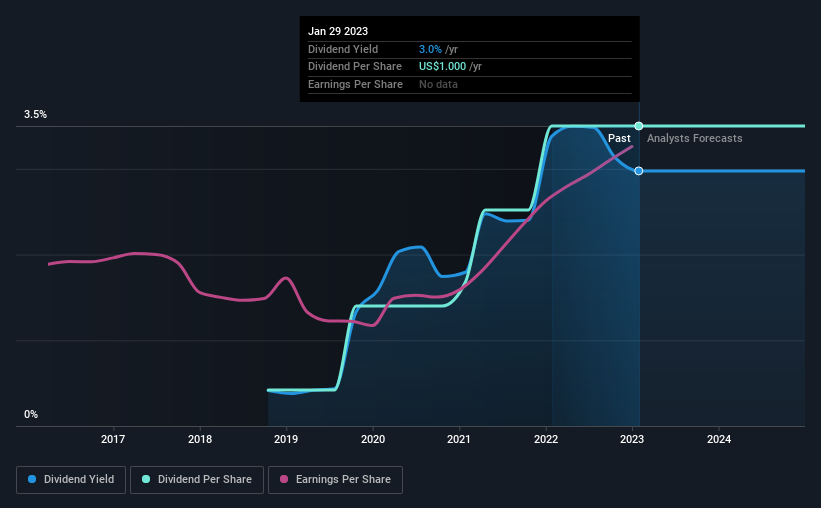- United States
- /
- Banks
- /
- NasdaqGS:BPRN
Princeton Bancorp (NASDAQ:BPRN) Has Announced That It Will Be Increasing Its Dividend To $0.30
Princeton Bancorp, Inc. (NASDAQ:BPRN) will increase its dividend on the 3rd of March to $0.30, which is 20% higher than last year's payment from the same period of $0.25. This takes the annual payment to 3.0% of the current stock price, which is about average for the industry.
Check out our latest analysis for Princeton Bancorp
Princeton Bancorp's Earnings Will Easily Cover The Distributions
We like to see a healthy dividend yield, but that is only helpful to us if the payment can continue.
Princeton Bancorp has a short history of paying out dividends, with its current track record at only 4 years. While it has a shorter history of paying out dividends, Princeton Bancorp's payout ratio of 23% is a great sign for current shareholders, as this means that earnings greatly cover dividends.
Over the next 3 years, EPS is forecast to expand by 1.3%. Analysts estimate the future payout ratio will be 24% over the same time period, which is in the range that makes us comfortable with the sustainability of the dividend.

Princeton Bancorp Doesn't Have A Long Payment History
The dividend has been pretty stable looking back, but the company hasn't been paying one for very long. This makes it tough to judge how it would fare through a full economic cycle. Since 2019, the annual payment back then was $0.12, compared to the most recent full-year payment of $1.00. This implies that the company grew its distributions at a yearly rate of about 70% over that duration. We're not overly excited about the relatively short history of dividend payments, however the dividend is growing at a nice rate and we might take a closer look.
The Dividend Looks Likely To Grow
The company's investors will be pleased to have been receiving dividend income for some time. We are encouraged to see that Princeton Bancorp has grown earnings per share at 16% per year over the past five years. With a decent amount of growth and a low payout ratio, we think this bodes well for Princeton Bancorp's prospects of growing its dividend payments in the future.
Princeton Bancorp Looks Like A Great Dividend Stock
Overall, a dividend increase is always good, and we think that Princeton Bancorp is a strong income stock thanks to its track record and growing earnings. Distributions are quite easily covered by earnings, which are also being converted to cash flows. All of these factors considered, we think this has solid potential as a dividend stock.
Investors generally tend to favour companies with a consistent, stable dividend policy as opposed to those operating an irregular one. However, there are other things to consider for investors when analysing stock performance. Case in point: We've spotted 2 warning signs for Princeton Bancorp (of which 1 is a bit concerning!) you should know about. If you are a dividend investor, you might also want to look at our curated list of high yield dividend stocks.
New: Manage All Your Stock Portfolios in One Place
We've created the ultimate portfolio companion for stock investors, and it's free.
• Connect an unlimited number of Portfolios and see your total in one currency
• Be alerted to new Warning Signs or Risks via email or mobile
• Track the Fair Value of your stocks
Have feedback on this article? Concerned about the content? Get in touch with us directly. Alternatively, email editorial-team (at) simplywallst.com.
This article by Simply Wall St is general in nature. We provide commentary based on historical data and analyst forecasts only using an unbiased methodology and our articles are not intended to be financial advice. It does not constitute a recommendation to buy or sell any stock, and does not take account of your objectives, or your financial situation. We aim to bring you long-term focused analysis driven by fundamental data. Note that our analysis may not factor in the latest price-sensitive company announcements or qualitative material. Simply Wall St has no position in any stocks mentioned.
About NasdaqGS:BPRN
Princeton Bancorp
Operates as the bank holding company for The Bank of Princeton that provides various banking products and services.
Flawless balance sheet with reasonable growth potential.
Market Insights
Community Narratives




